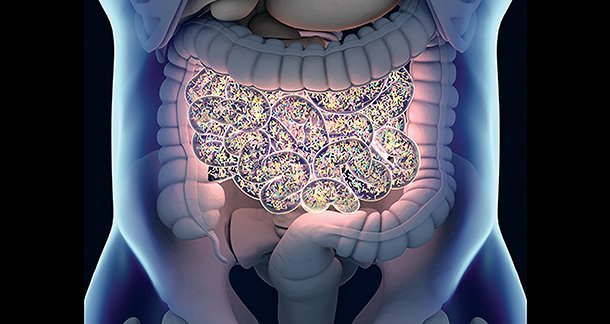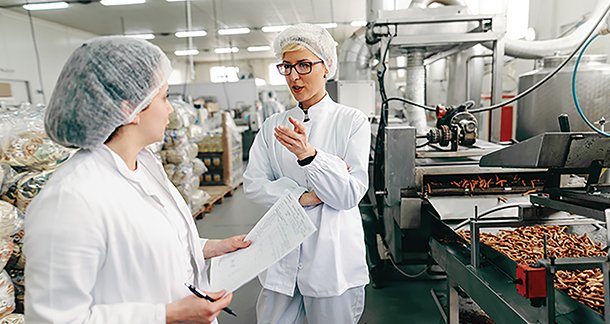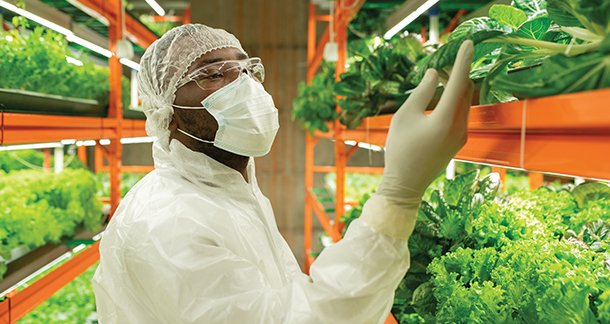AI-powered technologies, innovations that enable decoupling and breakthroughs in the gut microbiome space could provide much needed solutions to the food industry’s problems – if startups are supported.
According to estimates compiled by the Food and Agriculture Organization (FAO), by 2050 we will need to produce 60 per cent more food to feed a world population of over nine billion.
It is widely acknowledged that our cur-rent food production system cannot sustain this growth and that transformational change will be needed in order to feed the world equitably, healthily and sustainably.
No-one knows exactly how this future food system will look, but it is clear that technology will be key to solving this monumental challenge.
Futurist consultant Tony Hunter, who will be a keynote speaker at the upcoming Future of Nutrition Summit 2024 in Frankfurt, said: “We need to think about how we use technology to reimagine the global food system in the coming decades.”
He predicts that this will involve the ap-plication of novel technologies, to help humanity achieve more with less, lea-ding to what he calls a ‘TECHXponential’ food future.
But the challenge with disruptive or novel technologies is that they are not always here and now. It might be that they are early-stage startups that are not yet ready to leave the incubator, are stuck at the pilot stage and require in-vestment to scale-up, need the backing of an industry partner to make it to market, or are navigating a lengthy regulatory process.
So whilst emerging technologies have huge potential to reshape the food industry, there is a reality gap that needs to be bridged.
The Fi Europe Startup Challenge, now in its ninth year, has become an important platform for advancing potentially transformational solutions from young companies.
As well as benefitting from the kudos and publicity that goes hand in hand with clinching a prestigious Startup Challenge accolade, category winners can choo-se from a selection of high value business support packages as prizes.
Smartcore, the official digital marketing provider of Fi Europe, is proud to sponsor a prize in this year’s Startup Challenge, offering winners the opportunity to boost their online presence in 2025 with smarter digital campaigns.
Although it is built around an awards programme, the Challenge does more than recognize innovation. It nurtures startups by giving them business sup-port, constructive feedback, industry exposure and an opportunity to make the connections they need to scale up and grow.
The Challenge is seeing an increase year-on-year in the number of participants with tech-based solutions, a trend that is reflective of the rising importance of technology within the wider food industry.
Innovation is mainly centered around three strands of technology – Artificial Intelligence, decoupling and personalized nutrition – and it is no coincidence that these areas could make a valuable contribution to shaping the food system of the future.
Artificial Intelligence: genuine innovation
AI is already starting to make its mark in the food industry, primarily through AI-powered systems that can analyse large volumes of data very quickly. A number of startups are harnessing this capability to streamline the discovery and development of novel ingredients and molecules of importance. In this way, AI can save companies millions and eliminate was-ted effort from the R&D process.
AI also has the potential to transform the way in which foods are tested and inspected for quality control and safety purposes. By training machine learning models on large datasets of labelled images, computer vision models can learn to recognize patterns and make accurate assessments of quality based on these visual features. This allows companies to automate processes that have historically been carried out manually or not at all. Examples include the inspection of non-uniform fresh produce and honey pollen analysis.

There are many more examples of how AI can accelerate processes and provide data-driven insights, from analysing vast amounts of satellite imagery to identify and map areas of deforestation in near real-time to powering precision farming techniques that optimize resource use.
Deep Detection: AI-powered, photon-counting X-ray inspection Deep Detection, winner of the ‘Most innovative service or AI solution supporting the food & beverage industry’ award in last year’s Startup Innovation Challenge, is a great example of a young company that is leveraging AI to benefit the industry.
The Catalonian startup has brought multispectral X-ray technology to the field of industrial inspection through the application of AI. Its PhotonAi cameras can be deployed on high-speed continuous production lines to identify low-density contaminants that can’t be detected with current methods.
David Ciudad Rodriguez, CEO and co-founder, said: “The food sector wants to produce safe food products, but one persistent problem has been the detection of foreign bodies such as plastics, bones, and glass. While manufacturers are willing to invest in solutions that can help ensure the quality reputation of their brand, systems today have been far from adequate.”
PhotonAi takes inspection performance to new heights, delivering high-speed, high-accuracy detection of foreign bodies, defects and flaws.
Decoupling strategies
The decoupling of food production from land use has to happen if resource productivity is to reach a sustainable level, and that means transitioning towards a plant-based food system. Technologies that can support this shift include vertical farming, molecular agriculture and precision fermentation, and it is likely that all three will feature in the foods-cape of tomorrow.
As climate change threatens conventional agriculture, vertical farms, which provide a controlled, consistent growing environment, will build resilience and predictability into food systems. Vertical farms allow for the cultivation of crops closer to the source of consumption, and use considerably less water than outdoor agriculture.
Molecular agriculture – which genetically programmes plants to synthesize other substances, such as animal- or dairy-identical proteins – is another decoupling technology tipped as having disruptive potential.
However, resistance to genetically modified organisms is a major obstacle that needs to be overcome if it is to be advanced, according to Christine Gould, CEO and founder of Thought For Food.
“It’s time for a new conversation about GMOs. We need to move past the use case of Roundup Ready and how big corporations are controlling our food systems, to how we can use the power of biology to build better and new food systems,” she said, addressing the Fi Eu-rope 2023 Future of Nutrition Summit.

The same hurdle faces innovators in precision fermentation, in which micro-organisms rather than plants are reengineered to produce substances such as proteins and flavors.
Arkeon: animal-free amino acid production
Less controversial are technologies that support decoupling through the production of food products via conventional fermentation, such as Arkeon’s techno-logy, which uses microbial gas fermentation to turn CO2 into amino acids.
Colonies of archaea – a group of micro-organisms similar to but distinct from bacteria – are fed industrial waste gases, and amino acids are produced through a pa-tent-pending gas fermentation process.
“These microbes feed on carbon di-oxide, along with hydrogen,” explained Arkeon co-founder Michael Mitsakos. “From these feedstocks, the archaea excrete amino acids through a membrane, which end up in a salty solution. We are then able to separate the amino acids from the salts.”
Through this ground-breaking process, Arkeon is able to produce the 20 amino acids essential to human health – essentially from industrial waste gases. The potential benefits of this are significant, from reducing the amount of CO2 emit-ted into the atmosphere to creating local ingredient supply chains.
“If you look at how food ingredients are made, they tend to be tied to land, plants, and animals. We wanted to think outside the box, and we landed on a process of producing amino acids from microbes. This means that you can bypass agriculture, and instead of using agricultural in-puts, use waste gases,” he said.
This innovative approach to amino acid production technology earned the Austrian start-up the ‘Most Innovative Plant-Based or Alternative Ingredient’ accolade in the 2023 Startup Innovation Challenge.
Unlocking the gut microbiome There is mounting evidence that the gut microbiome is intrinsically linked with overall health, including obesity risk. Most recently, at the 2024 European Congress on Obesity, researchers from the University of Navarra revealed how an imbalance in distinct bacterial groups is likely to play an important role in the onset and development of obesity.
The personalized nutrition industry is drawing on this growing body of gut microbiome science to inform the development of consumer data led solutions. ZOE, for example, uses stool testing kits, continual glucose monitors, diet diaries and lifestyle questionnaires to provide gut health focused nutrition advice.
Growing recognition of the far-reaching impact of the gut microbiome on health is also driving demand for technologies that can assist both scientists in furthering their research and food manufacturers in developing products. This includes models that can simulate personalized, microbiome-mediated responses to different diets and inputs.
Pioneering technologies to elucidate the interconnectiveness NIUM, a University of Luxembourg spin-off, has developed an in vitro model for assessing how foods and ingredients might impact the gut microbiome and metabolism.
The idea for NIUM was born out of Alberto Noronha’s doctoral studies at the University of Luxembourg, when he discerned that there was a need for models that could precisely elucidate the dynamic impact of different foods on the community of microorganisms present in the gut.
NUIM’s model emulates the physio-logical conditions of the gut by leveraging microfluidics, and features a sophisticated suite of analytical soft-ware.

“The key advantage of our approach is our ability to conduct scalable testing of nutritional products,” explained Noronha. “This represents a ground-breaking advancement, particularly for companies engaged in the testing or screening of new products.”
For this breakthrough, NIUM was awarded the prize for the ‘Most Innovative Processing Technology or Technology Platform’ in the Fi Europe 2023 Startup Innovation Challenge.
Fi Europe: Championing Innovation There are so many ways in which technology can drive positive change in the food industry – the above mentioned examples are just the tip of the iceberg. But this will only happen if researchers, startups and innovators are encouraged and supported in their work. Fostering innovation in solutions-driven technology is at the core of Fi Europe’s ethos, and the event prides itself on the contribution the Star-tup Challenge makes in this respect. However, transformational change also requires futuristic thinking, constructive discussion and multi-stake-holder engagement, which is where the Future of Nutrition Summit has a part to play. Held on the day before Fi Europe opens, the Summit provides thought-provoking insights into the future of food as well as an unrivalled networking opportunity.
For more information: www.figlobal.com



